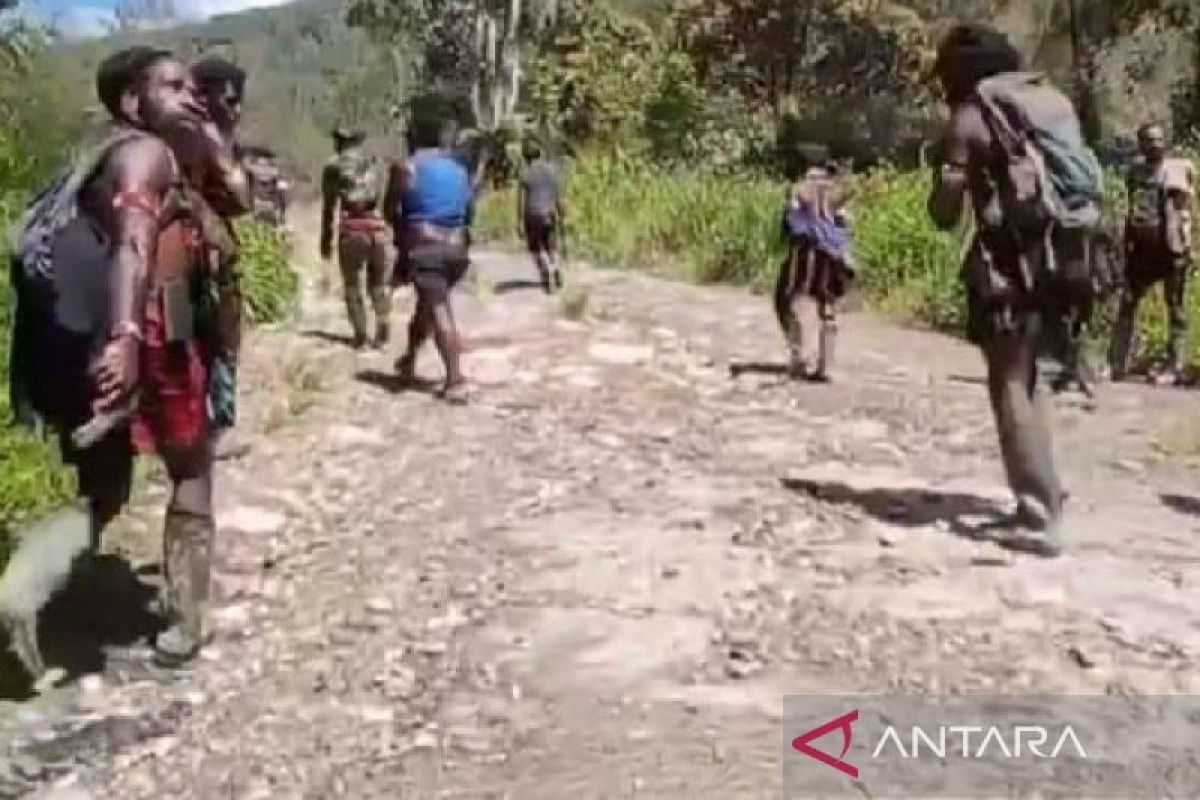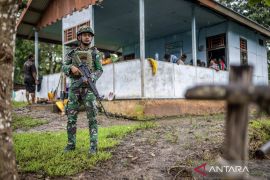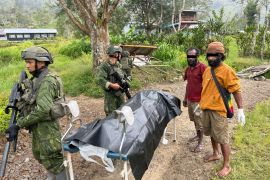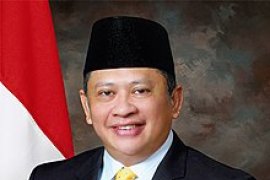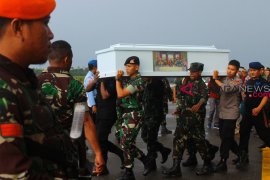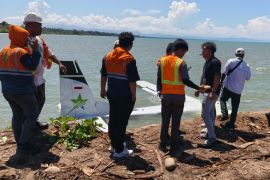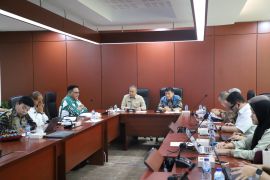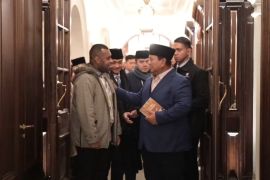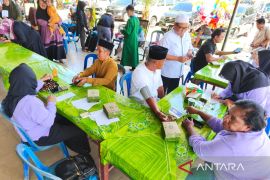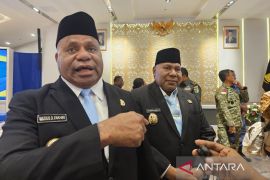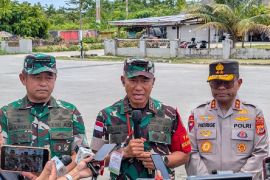"I will take firm action against what the OPM has done. There can be no country within a country," he stated, marking the start of a new chapter in the crackdown on the OPM.
The government's decision on April 5 to reuse the term OPM for armed separatists in Papua—previously called the Armed Criminal Group (KKB)--highlighted the gravity of eradicating this group.
The TNI has adopted a zero-tolerance approach towards OPM's actions, targeting civilians and personnel from the TNI and National Police (Polri).
General Agus also revealed that at various places, OPM members had also raped several teachers and health workers in rural areas.
Since then, the TNI and Polri, who are members of the Cartenz Peace Task Force, have begun their operation to hunt down the rebels.
On March 11, the Cartenz Peace Task Force succeeded in seizing two active OPM members–Afrika Heluka and Toni Wetapo a.k.a. Toni Giban— in Yahukimo District, Papua Mountain Province. The task force also managed to arrest six OPM members at the location.
The task force then escalated its action and operations when one of the members of TNI, Military District Commander (Danramil) of Aradide, Second Lieutenant Oktovianus Sogalrey, died in an OPM attack.
One of the OPM members recorded the act of abuse against Sogalrey, and the video was also circulated on social media.
The Panai OPM group is suspected of being the mastermind behind this brutal action. Since then, the TNI and Polri have stepped up their hunt for the OPM group.
"The OPM has done a serious violation of human rights,” Head of the TNI Information Center, Major General Nugraha Gumilar, stressed.
Minister of Political, Legal, and Security Affairs, Hadi Tjahjanto, also saw this problem as being serious.
Hence, he summoned the TNI commander and Polri chief to discuss strategies against the OPM.
To this end, it becomes crucial for the TNI and Polri to increase the intensity of their handling efforts against the OPM.
In addition, improving strategies to strengthen the protection of civilians in Papua must become a priority.
However, all of this will be futile unless coordination between the TNI and Polri is strengthened and prioritized.
"TNI-Polri synergy has become a mandatory requirement in Papua because the OPM has declared open war," said Ngasiman Djoyonegoro, an intelligence, defense, and security analyst.
Bolstering coordination can be realized by strengthening the main tasks and functions of each institution in dealing with the OPM.
Each institution must have sustainable main tasks and functions to optimally realize the handling of problems from upstream to downstream.
The grouping of main functions and responsibilities is also exemplified by tasking Polri with community security and evacuation, while territorial security and hunting for OPM members can be carried out by the TNI through ground troops.
Apart from that, intelligence, as the main sector for distributing accurate information, must be utilized properly by the state. The TNI can utilize intelligence data to organize strategies for pursuing and ambushing the OPM.
However, the strengthening of quality human resources must be carried out to realize such things, not just in terms of intelligence but also physical strengthening, considering the difficult terrain in Papua.
With mastery over the terrain and precise tactics, he believes the TNI would be able to complete its tasks in the field.
Political support
Apart from physical enforcement efforts, all actions taken by the TNI and Polri must be based on the instructions of the president as supreme commander.
Hence, a strong political decision is needed to serve as a basis for law enforcers to eradicate the OPM.
"As long as there are no changes in state policies and decisions, the TNI's military operations other than war (OMSP) in Papua will still remain the same," said Khairul Fahmi, military observer and co-founder of the Institute for Security and Strategic Studies (ISESS).
The executive and legislative parties must also agree to seriously eradicate OPM.
This similarity of opinion between the government and the legislature can later result in a political decision in the House of Representatives (DPR) that will become the basis for taking firm action.
With this political foundation, the TNI and Polri can freely carry out their duties without having to be bogged down by accusations of human rights violations.
This political support also seems to have been extended by the People's Consultative Assembly (MPR). Its chairman, Bambang Soesatyo, expressed his full support for the TNI's efforts to take firm action against the OPM.
The state must prioritize the security and safety of the Papuan people. Any group that threatens the sovereignty of the Republic of Indonesia or the safety of society must be opposed.
"The authorities need to take firm action to show that the country will not lose to separatist groups whose scale is smaller than the TNI and Polri," Bambang emphasized.
His statement was a green light for legislative members to support eradicating the OPM.
Human rights’ point of view
The National Human Rights Commission (Komnas HAM) also condemned OPM's acts of violence against women and children, as well as the death of Danramil Oktovianus Sogalrey.
Any form of violence against officials and civil society must be thoroughly and transparently investigated.
Komnas HAM also recorded several cases of violence that occurred in Papua from March to April.
Chairman of Komnas HAM, Atnike Nova Sigiro, detailed violent incidents that occurred in March, including a firefight between security officers and an armed civilian group in Intan Jaya and the shooting of two TNI soldiers allegedly carried out by an armed group in Puncak Jaya.
On April 5, two women became victims of sexual violence and abuse by a group of people in Nabire Sub-district.
Despite OPM's brutal actions against officers and civilians, Komnas HAM still urges the government to prioritize a measured approach to dealing with the group.
This measured approach aims to overcome the excessive use of violent force by the state.
According to Sigiro, undue use of violence also raises the vulnerability of human rights violations. This is prone to new conflicts in which the resolution will take longer.
For this reason, Komnas HAM prefers another approach to resolving the OPM conflict, namely the provision of equitable infrastructure by the government for the Papuan people.
The government must provide health services, education, and local economic development. Thus, disparities in economy, health, and education between Papuan people and residents in other regions can be reduced.
Related news: Komnas HAM pushed government to strengthen ecosystem of peace in Papua
Related news: Govt urged to take firmer actions against Papuan rebels: MPR
Translator: Walda Marison, Resinta Sulistiyandari
Editor: Anton Santoso
Copyright © ANTARA 2024
